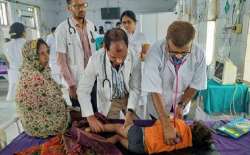Bihar children deaths: Team of doctors blames administrative failure, state's apathy for tragedy
Most of the children were malnourished and none had been treated for it. Also, none of them had growth-monitoring cards, a preliminary report prepared by the fact-finding team of doctors under the banner of "Progressive Medicos and Scientists' Forum" (PMSF) stated.

A group of doctors, which conducted an independent inquiry into the recent deaths of children in Bihar's Muzaffarpur district, has blamed "administrative failure" and the "state's apathy towards people" for the tragedy.
It has also claimed that the parents of most of the deceased children had no access to the public distribution system as they did not have ration cards.
Most of the children were malnourished and none had been treated for it. Also, none of them had growth-monitoring cards, a preliminary report prepared by the fact-finding team of doctors under the banner of "Progressive Medicos and Scientists' Forum" (PMSF) stated.
The group also had doctors from the All India Institute of Medical Sciences (AIIMS) in New Delhi.
These deaths have been happening for the last 10 years and still, there is no preventive mechanism and health awareness for specific illnesses or a common ailment like diarrhoea in the area, PMSF national convenor and former president of AIIMS Resident Doctors' Association (RDA) Dr Harjit Singh Bhatti said.
"There is a severe shortage of drinking water and no functional sewerage system in the entire Muzaffarpur district. Sanitation is very poor, even at the health facilities," he added.
While experts are trying to pinpoint the etiology behind this convulsive illness and the related deaths, the team of doctors arrived at a conclusion that whatever be the specific etiology, these children were "killed by administrative failure and the state's apathy towards people".
"ASHA workers, sub-centres and anganwadi services are deficient in their numbers and functions and people do not have faith in the local health system.
Immunisation services are poor," the team said in its report.
The report highlighted that the nearest primary health centres and community health centres were abysmally dysfunctional in terms of resources and manpower, as compared to the national health standards.
At the Sri Krishna Medical College and Hospital (SKMCH), the nearest medical college, one emergency room catering to 500 patients a day is manned by only four doctors and three nurses and there is a chronic shortage of medications and equipment, the report said, adding that the wards and ICUs are also not well equipped to cater to the patients.
"The doctors are working hard overtime, despite the poor conditions and lack of resources, although proper protocols are not in place for a standardised treatment and the period of stay in the hospital. It has been noted in some cases that after treating for hypoglycemia, the children were discharged in a few hours and they died at home due to developing hypoglycemia," the report said.
The doctors' group claimed that despite faults at various levels, no action was taken against any official.
"Rather a senior resident (doctor) was suspended, which is apparently inappropriate action and would be deemed as scapegoating in an attempt to slide the gross negligence under the carpet," the report said.
"Looking at these points, this kind of disasters are always waiting to happen in this area. The government is trying to hide its apathy towards people behind the jargons of etiological research of a 'mysterious' disease. While scientists are working on the etiological research, the focus of the state should be on strengthening the healthcare infrastructure so that such disasters can be prevented," it added.
ALSO READ | Bihar: 7-year-old visits hospital with fracture in left hand, doctor puts plaster on right